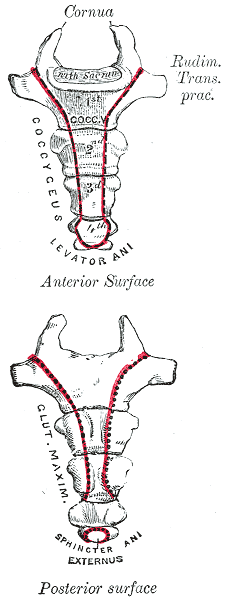coccyx
Appearance
English
[edit]
Etymology
[edit]From Latin coccyx, from Ancient Greek κόκκυξ (kókkux, “cuckoo”), referring to the curved shape of a cuckoo's beak when viewed from the side.
Pronunciation
[edit]- (General American) IPA(key): /ˈkɑksɪks/
- (Received Pronunciation) IPA(key): /ˈkɒksɪks/
Audio (US): (file)
Noun
[edit]coccyx (plural coccyges)
- (medicine, formal) The final (bottom-most) fused vertebrae at the base of the spine, the tailbone.
- 2018, Richard Powers, The Overstory, Vintage (2019), page 129:
- He lands on the concrete path and bounces on his coccyx, which cracks the base of his spine.
- 2024 January 30, Elle Hunt, “‘With orgasm people strive for oblivion’: Poor Things’ intimacy coordinator on consent, orgies and Emma Stone”, in The Guardian[1], →ISSN:
- An actor herself, McAlpine was hands-on, demonstrating “how you penetrate” on screen: “If you can move your coccyx, just arch your back slightly, it looks fantastic,” she says happily. “Those orgy scenes were amazing.”
Synonyms
[edit]- tailbone (informal)
Hypernyms
[edit]Derived terms
[edit]Translations
[edit](anatomy) final fused vertebrae
|
Further reading
[edit]coccyx on Wikipedia.Wikipedia
Category:coccyx on Wikimedia Commons.Wikimedia Commons
French
[edit]Etymology
[edit]Borrowed from Ancient Greek κόκκυξ (kókkux).
Pronunciation
[edit]Noun
[edit]coccyx m (plural coccyx)
Further reading
[edit]- “coccyx”, in Trésor de la langue française informatisé [Digitized Treasury of the French Language], 2012.
Latin
[edit]Etymology
[edit]Borrowed from Ancient Greek κόκκῡξ (kókkūx).
Pronunciation
[edit]- (Classical Latin) IPA(key): /ˈkok.kyːks/, [ˈkɔkːyːks̠]
- (modern Italianate Ecclesiastical) IPA(key): /ˈkot.t͡ʃiks/, [ˈkɔtː͡ʃiks]
Noun
[edit]coccȳx m (genitive coccȳgis); third declension
Declension
[edit]Third-declension noun.
| singular | plural | |
|---|---|---|
| nominative | coccȳx | coccȳgēs |
| genitive | coccȳgis | coccȳgum |
| dative | coccȳgī | coccȳgibus |
| accusative | coccȳgem | coccȳgēs |
| ablative | coccȳge | coccȳgibus |
| vocative | coccȳx | coccȳgēs |
References
[edit]- “coccyx”, in Charlton T. Lewis and Charles Short (1879) A Latin Dictionary, Oxford: Clarendon Press
- coccyx in Gaffiot, Félix (1934) Dictionnaire illustré latin-français, Hachette.
Portuguese
[edit]Noun
[edit]coccyx m (invariable)
- Pre-reform spelling (used until 1943 in Brazil and 1911 in Portugal) of cóccix.
Categories:
- English terms borrowed from Latin
- English terms derived from Latin
- English terms derived from Ancient Greek
- English 2-syllable words
- English terms with IPA pronunciation
- English terms with audio pronunciation
- English lemmas
- English nouns
- English countable nouns
- English nouns with irregular plurals
- en:Medicine
- English formal terms
- English terms with quotations
- en:Skeleton
- French terms borrowed from Ancient Greek
- French terms derived from Ancient Greek
- French 2-syllable words
- French terms with IPA pronunciation
- French terms with audio pronunciation
- French lemmas
- French nouns
- French countable nouns
- French masculine nouns
- fr:Anatomy
- Latin terms borrowed from Ancient Greek
- Latin terms derived from Ancient Greek
- Latin 2-syllable words
- Latin terms with IPA pronunciation
- Latin lemmas
- Latin nouns
- Latin third declension nouns
- Latin masculine nouns in the third declension
- Latin terms spelled with Y
- Latin masculine nouns
- la:Anatomy
- Portuguese lemmas
- Portuguese nouns
- Portuguese indeclinable nouns
- Portuguese countable nouns
- Portuguese terms spelled with Y
- Portuguese masculine nouns
- Portuguese forms superseded in 1943
- Portuguese forms superseded in 1911